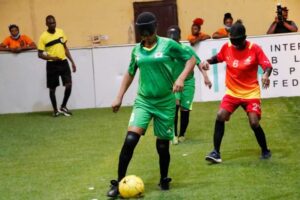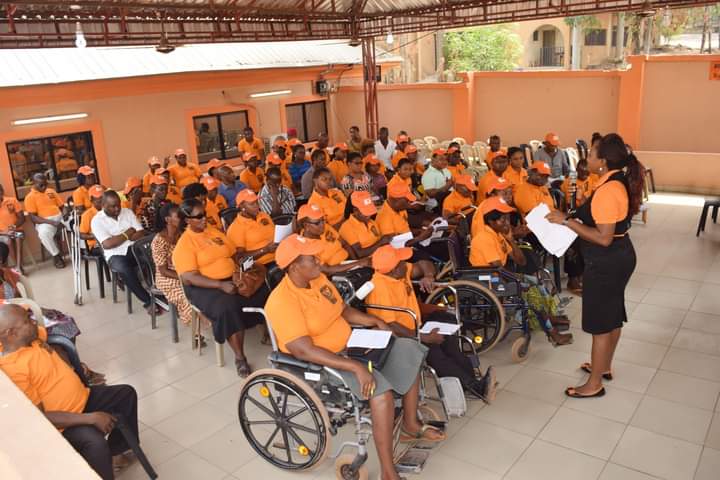“Can you feel the earth beneath your feet?”
A soft smile spread across Janet Nwalima’s face as her fingers brushed the smooth turf beneath her. “It feels safe, warm somehow,” she murmured with a hint of wonder. For a woman who had been without sight for almost twenty years, each little sensation was a treasure.
Beside her, Grace Gambo shifted, adjusting her crutches for comfort. Then she laughed. “Safe? Maybe for you. For me, it’s just a reminder that I can’t feel the ground the way you do.” she grinned. “But that doesn’t mean I can’t lift the world.”
Their laughter filled the space, rich with resilience and tinged with both hardship and triumph. Despite everything they had been through, here they were: two women united by struggle and strength. Though their journeys were different, they were bonded by the determination to overcome and defy limitations.
Grace and Janet were on their way to represent Enugu and Abuja in national sports—the former as a powerlifter and the latter as a blind footballer. This was made possible by the Bina Foundation, a local nonprofit transforming the lives of people with disabilities, not only through sports but also by equipping them with practical skills and trades for a brighter future.
Janet’s journey into darkness was gradual. Growing up in Enugu, she was the girl who could outrun her brothers and loved reading under the mango tree in their backyard. But a diagnosis of retinitis pigmentosa changed everything. Over a few short years, her world was engulfed by darkness.
“People look at you like you’re invisible,” Janet reflected, recalling how some friends drifted away, not knowing how to relate to her new reality. Family members spoke in soft, pitying tones, as if she couldn’t hear. But the hardest part was feeling as though she no longer existed to the world around her.
Grace’s story mirrored Janet’s in many ways. At 15, an accident paralysed her from the waist down, robbing her of the ability to walk. “People forget you exist when they think you’re broken,” she said. “And after a while, you start believing them.” Active and sharp-witted, she struggled with society’s low expectations.
Then, both women discovered the Bina Foundation through a therapy programme they attended in Abuja, and for the first time in years, hope found its way back into their lives.
The women met on their first day at Bina Foundation. A counsellor introduced them, sensing the strength they shared.
Grace raised an eyebrow. “What’s that?”
“More strength than you can imagine,” the counsellor replied.
They laughed, not quite sure what to make of it. Soon, however, they understood. Bina wasn’t just a place for “helping” people with disabilities—it was a place that empowered them, rebuilt their confidence, and pushed them to realise their potential. For Janet, that meant blind football; for Grace, it was powerlifting.
The foundation also empowered others through skill-building in crafts, trades, and entrepreneurship. Those who came through Bina’s doors found niches in carpentry, tailoring, digital design, baking, or hairdressing. For many, these skills became lifelines to independence and self-respect.
“I thought they’d just help me get around better,” Grace said to Janet one evening. “But they taught me to lift weights and build a life.”
Janet nodded in comprehension. “They showed me I could still be good at something—even without sight.”
Feel the Strength, Not the Limitations
In time, Janet grew used to her guide and teammates. The football had a noise-emitting component, allowing players to locate it by sound and touch rather than sight.
“At first, I thought it was a joke,” Janet confided in Grace. “A blind woman playing football?”
Grace chuckled, lifting weights as they spoke. “And me? When they told me I could be a powerlifter, I thought they were teasing. But then I thought, ‘Why not? I’ve been lifting burdens all my life.’”
Their training sessions were gruelling. Grace woke up sore from lifting, muscles aching in places she hadn’t known existed. Janet had to trust her body and her sense of space on the field, relying on her other senses with each kick and step.
For others at Bina, like Mercy, who had a partial hearing impairment, and Felix, who had lost a limb, skill-building opened new paths. Mercy found her passion in baking, eventually launching her own pastry business. Felix found solace in woodworking, crafting intricately carved furniture that helped him support his family.
Not Just Medals
The day of their first competition arrived. Grace was tense, gripping her crutches tightly. Next to her, Janet appeared calm.
“How are you not freaking out right now?” Grace whispered.
Janet shrugged, her unseeing eyes focused ahead. “I’ve lived in darkness my whole life. This is just another kind of unknown.”
Grace smiled. “Then let’s win this together.”
At the whistle, Janet charged forward, guided by the sounds around her. The stadium erupted when she scored her first goal—an indescribable moment that felt like reclaiming a piece of herself.
In the powerlifting arena, Grace took a deep breath and grasped the bar. Summoning all her strength, she lifted it overhead, steady and unmoving until the referee signalled her success. Tears welled up as she lowered the weights, overcome by her victory.
Afterwards, they met, breathless with joy.

The Power of Community and Possibility
Through the Bina Foundation, both women found strength, purpose, and a sense of belonging. The foundation offered them a community that saw them not for their disabilities but for their potential.
“Without Bina Foundation,” Grace said during an interview, “I don’t think I would have ever believed I could be more than just a girl with crutches.”
Janet nodded solemnly. “People tend to make you disappear when they don’t know how to see you. But thanks to Bina, we found our own way of being seen, and it’s more powerful than sight.”
Bina Foundation’s impact extends far beyond the playing fields. Each month, it hosts workshops in tailoring, jewellery-making, and farming, equipping people with skills to reshape their lives and strengthen their families. These efforts not only empower individuals but also create jobs and open doors for those who once saw none.
For Janet, Grace, and countless others whose lives have been touched, Bina Foundation’s legacy is one of resilience, empowerment, and hope.
Janet Nwalima and Grace Gambo, two women with disabilities, found resilience and empowerment through the Bina Foundation, a nonprofit transforming the lives of people with disabilities by promoting sports and equipping them with practical skills. Janet, blind due to retinitis pigmentosa, embraced blind football, while Grace, paralyzed from the waist down by an accident, pursued powerlifting. Their journeys, marked by initial societal neglect, took a turn when they joined the Foundation, which instilled hope, confidence, and self-worth in them.
The Foundation doesn’t just focus on helping individuals get better daily but empowers them through sports and skill-building programs like carpentry, tailoring, and more. Janet's and Grace's competitive successes marked personal triumphs, highlighting the power of community and potential beyond disabilities. Bina Foundation also extends its reach through workshops, creating jobs and opportunities, fostering empowerment, and providing hope and self-belief to individuals who once struggled to see or believe in their own potential.






